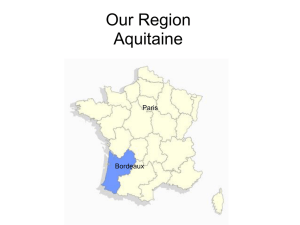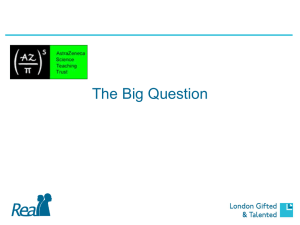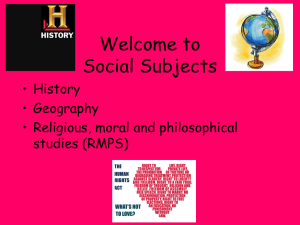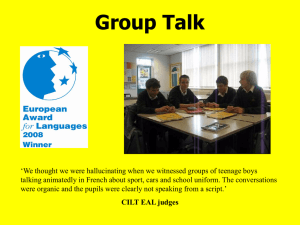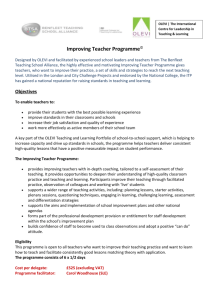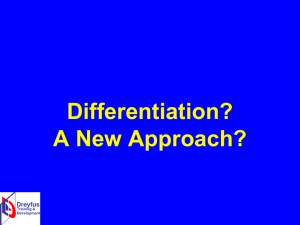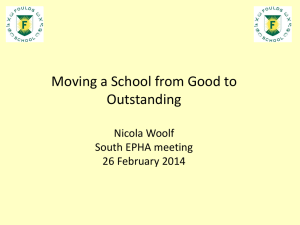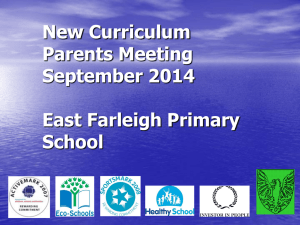Preparing-For-Estyn - Abertillery Comprehensive School
advertisement
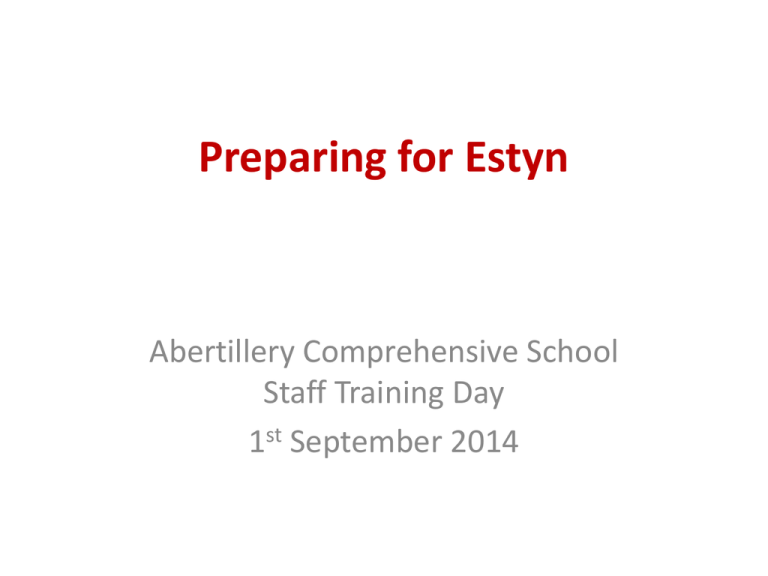
Preparing for Estyn Abertillery Comprehensive School Staff Training Day 1st September 2014 Estyn expect to see: • Greater focus on improvement in teaching and learning • Progress in literacy skills in lessons • More and better writing for learning • Better performance by boys Weaknesses in lessons: • Slow pace • Questioning does not extend pupils’ understanding • Too much teacher direction • Low expectations • Insufficiently challenging tasks • Incomplete tasks • Variable quality of feedback Building on Success The answers are here! • • • • • Clear learning intentions Good pace High expectations Challenging demands Well-organised individual, pair and group activities • Skilful questioning • Engaging, enthusiastic delivery Pedagogy Framework E C L T F I E V The Learning Process R Teaching Strategies E Enhanced learner outcomes and wellbeing E P Relationships and Environment R A C I C T What makes a Grade 1 lesson? 1. Plan the programme for the inspection week as the culmination of units or sequences of work What makes a Grade 1 lesson? 2. Focus on the learning intentions: – refer to the bigger picture! – enquiry-based learning: teaching for curiosity – build in differentiation – have examples of feedback and assessment for learning What makes a Grade 1 lesson? 3. Showcase the students! (and demonstrate their learning!) What makes a Grade 1 lesson? 4. Plan for high levels of interaction and participation – probing questions! 5. Have examples of helpful feedback to learners - how they can improve? What makes a Grade 1 lesson? 6. Spontaneity – go with the students! 7. Be prepared to take risks! 8. Enjoy the lessons! What is a unit? • • • • A sequence of lessons With clear learning objectives/ intentions Including a variety of learning activities Based on the exploration of a subject-related topic or theme (big questions!) • Leading to a major task, test, assignment or performance • Resulting in feedback to the learner (AfL) against clear criteria Language and Learning, 00 Month 2010 18 Challenge! • • • • • • Raise our expectations of all pupils Focus on big questions Set more extended and ambitious tasks Build in differentiation Put language at the heart of learning Research, problem-solving and evaluation Task setting: levels of challenge Knowledge/skills Purpose/outcome 1 locating retrieval 2 re-ordering presentation 3 applying solving problems 4 adapting teaching others 5 researching synthesising 6 reflecting, evaluating theorising, creating Language and Learning, 00 Month 2010 20 Task setting: differentiation Learning objective All pupils will….. Some pupils will….. A few pupils will….. Language and Learning, 00 Month 2010 21 Questioning: • • • • • • • • • Why do you think that? What do you notice when…? What do you mean by…? Is there another way…? What would happen if…? Can you show me how…? Will it always work? What might explain it? How can you test it? Language for learning! • Speaking and listening activities • Reading for learning • Planning extended writing Learning through talk Varieties of classroom talk questions reading out answers debates arguments role-play gossip sharing news discussion telling stories seeking approval Interruptions jokes thinking aloud giving information exploring ideas performing making presentations protesting complaining shouting Language and Learning, 00 Month 2010 25 Traditional class discussion: Teacher dominated discussion: characterised by direction, requests and demands – pupils cast in passive/reactive roles 1. Teacher initiates talk/ poses question 2. Individual pupil responds 3. Teacher gives feedback – confirmation of ‘right’ or ‘wrong’ answer 4. Teacher answers own question Language and Learning, 00 Month 2010 26 Talking for learning: • Exploratory talk – pondering, speculation, thinking aloud • Clarification - formulating and refining ideas • Hypothesising - solving problems • Disputational talk – characterised by disagreement and the development of personal opinion • Collaborative talk – problem solving The best oral work is: • Collective – teachers and pupils address tasks together • Reciprocal – listen, share ideas and consider alternatives • Supportive – articulate freely without fear of ‘wrong’ answers • Cumulative – building on one another’s ideas • Purposeful – teachers plan talk with educational goals in view Reading and learning Reading: the challenge • ‘High proportions of pupils in Wales reported in the PISA survey that they do not like reading and do not engage in reading on a frequent basis.’ • (Estyn) Wide reading – building positive attitudes • • • • • • • • Building on primary school habits Independent reading Expectations of reading whole texts Interactive reading (on-line) Reading and boys Role of the library Links with home Visual literacy – using media texts Writing for learning Year 8 sample: • • • • • • • Too few opportunities for extended writing Lack of progress and improvement over time Inconsistent expectations between subjects Narrow range of purposes and audiences Frequent low level tasks Untidy and incomplete work Limited impact of teachers’ feedback Kinds of writing reporting poetry Description Recording Discussion Giving Instructions Explanations Accounts/Re-telling Argument and Persuasion Exploration Evaluation Narrative Language and Learning, 00 Month 2010 34 Understanding the main types of text: • Narrative – give a sequenced account in the past tense • Instruction – tell the reader how to do something • Description – describe characteristics/ provide information • Explanation – processes/ cause and effect • Persuasion – argue a case/ single point of view • Discussion – balanced presentation of information and arguments Understanding writing process vs product Product Arbitrary task – necessary chore ‘One-shot’ Solitary confinement Artificial – de-contextualised Notes – ‘fair copy’ – test rehearsal Exercise book/worksheet Teacher/reader as assessor Understanding writing process vs product Product Process Arbitrary task – necessary chore Stimulus – interest ‘One-shot’ Text evolves – extended tasks Solitary confinement Collaboration – discussion Artificial – de-contextualised Context – audience and purpose Notes – ‘fair copy’ – test rehearsal Discussion, preparation and drafting, feedback Exercise book/worksheet Presentation – colourful formats Teacher/reader as assessor Publication – distribution and display Feedback! • Praise is important – but should be earned! • Assess the writing against the purpose and the specific criteria for success • Good writers also need to know what was good • All writers need to know how to improve – and the opportunity to make those improvements! • Two stars and a wish – be subject specific! Where are we going? ‘In short, real improvement doesn’t come about through fear of threats about targets or having inspections hovering over you (though both of these can serve to sharpen the mind!). Real improvement is a feature of learning organisations.’ John Macbeath What worked in successful schools? ‘Raised expectations and a sense of aspiration which flowed across the whole school from headteacher to teachers and support staff to learners’ Thank you – and enjoy the new term!




